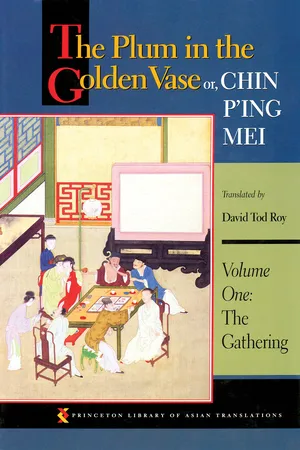
The Plum in the Golden Vase or, Chin P'ing Mei, Volume One
The Gathering
- 520 pages
- English
- ePUB (mobile friendly)
- Available on iOS & Android
About this book
The first volume of a celebrated translation of the classic Chinese novel
This is the first volume in David Roy's celebrated translation of one of the most famous and important novels in Chinese literature. The Plum in the Golden Vase or, Chin P'ing Mei is an anonymous sixteenth-century work that focuses on the domestic life of Hsi-men Ch'ing, a corrupt, upwardly mobile merchant in a provincial town, who maintains a harem of six wives and concubines. The novel, known primarily for its erotic realism, is also a landmark in the development of the narrative art form—not only from a specifically Chinese perspective but in a world-historical context.
With the possible exception of The Tale of Genji (1010) and Don Quixote (1615), there is no earlier work of prose fiction of equal sophistication in world literature. Although its importance in the history of Chinese narrative has long been recognized, the technical virtuosity of the author, which is more reminiscent of the Dickens of Bleak House, the Joyce of Ulysses, or the Nabokov of Lolita than anything in the earlier Chinese fiction tradition, has not yet received adequate recognition. This is partly because all of the existing European translations are either abridged or based on an inferior recension of the text. This translation and its annotation aim to faithfully represent and elucidate all the rhetorical features of the original in its most authentic form and thereby enable the Western reader to appreciate this Chinese masterpiece at its true worth.
Frequently asked questions
- Essential is ideal for learners and professionals who enjoy exploring a wide range of subjects. Access the Essential Library with 800,000+ trusted titles and best-sellers across business, personal growth, and the humanities. Includes unlimited reading time and Standard Read Aloud voice.
- Complete: Perfect for advanced learners and researchers needing full, unrestricted access. Unlock 1.4M+ books across hundreds of subjects, including academic and specialized titles. The Complete Plan also includes advanced features like Premium Read Aloud and Research Assistant.
Please note we cannot support devices running on iOS 13 and Android 7 or earlier. Learn more about using the app.
Information
Table of contents
- Cover Page
- Title Page
- Copyright Page
- Dedication Page
- Contents
- List of Illustrations
- Acknowledgments
- Introduction
- Cast of Characters
- Preface to the Chin P’ing Mei tz’u-hua
- Preface to the Chin P’ing Mei
- Colophon
- Four Lyrics to the Tune “Burning Incense”
- Lyrics on the Four Vices to the Tune “Partridge Sky”
- chapter 1 Wu Sung Fights a Tiger on Ching-yang Ridge; P’an Chin-lien Disdains Her Mate and Plays the Coquette
- chapter 2 Beneath the Blind Hsi-men Ch’ing Meets Chin-lien; Inspired by Greed Dame Wang Speaks of Romance
- chapter 3 Dame Wang Proposes a Ten-part Plan for “Garnering the Glow”; Hsi-men Ch’ing Flirts with Chin-lien in the Teahouse
- chapter 4 The Hussy Commits Adultery behind Wu the Elder’s Back; Yün-ko in His Anger Raises a Rumpus in the Teashop
- chapter 5 Yün-ko Lends a Hand by Cursing Dame Wang; The Hussy Administers Poison to Wu the Elder
- chapter 6 Hsi-men Ch’ing Suborns Ho the Ninth; Dame Wang Fetches Wine and Encounters a Downpour
- chapter 7 Auntie Hsüeh Proposes a Match with Meng Yü-lou; Aunt Yang Angrily Curses Chang the Fourth
- chapter 8 All Night Long P’an Chin-lien Yearns for Hsi-men Ch’ing; During the Tablet-burning Monks Overhear Sounds of Venery
- chapter 9 Hsi-men Ch’ing Conspires to Marry P’an Chin-lien; Captain Wu Mistakenly Assaults Li Wai-ch’uan
- chapter 10 Wu the Second Is Condemned to Exile in Meng-chou; Hsi-men and His Harem Revel in the Hibiscus Pavilion
- chapter 11 P’an Chin-lien Instigates the Beating of Sun Hsüeh-o; Hsi-men Ch’ing Decides to Deflower Li Kuei-chieh
- chapter 12 P’an Chin-lien Suffers Ignominy for Adultery with a Servant; Stargazer Liu Purveys Black Magic in Pursuit of Gain
- chapter 13 Li P’ing-erh Makes a Secret Tryst over the Garden Wall; The Maid Ying-ch’un Peeks through a Crack and Gets an Eyeful
- chapter 14 Hua Tzu-hsü Succumbs to Chagrin and Loses His Life; Li P’ing-erh Invites Seduction and Attends a Party
- chapter 15 Beauties Enjoy the Sights in the Lantern-viewing Belvedere; Hangers-on Abet Debauchery in the Verdant Spring Bordello
- chapter 16 Hsi-men Ch’ing Is Inspired by Greed to Contemplate Matrimony; Ying Po-chüeh Steals a March in Anticipation of the Ceremony
- chapter 17 Censor Yü-wen Impeaches Commander Yang; Li P’ing-erh Takes Chiang Chu-shan as Mate
- chapter 18 Lai-pao Takes Care of Things in the Eastern Capital; Ch’en Ching-chi Supervises the Work in the Flower Garden
- chapter 19 Snake-in-the-grass Shakes Down Chiang Chu-shan; Li P’ing-erh’s Feelings Touch Hsi-men Ch’ing
- chapter 20 Meng Yü-lou High-mindedly Intercedes with Wu Yüeh-niang; Hsi-men Ch’ing Wreaks Havoc in the Verdant Spring Bordello
- appendix I: Translator’s Commentary on the Prologue
- appendix II: Translations of Supplementary Material
- Notes
- Bibliography
- Index